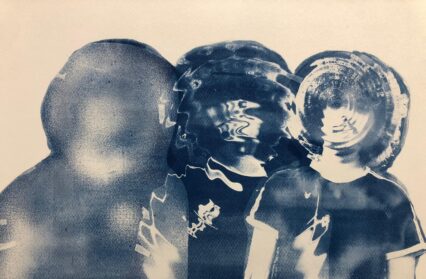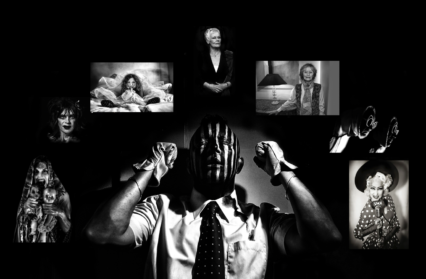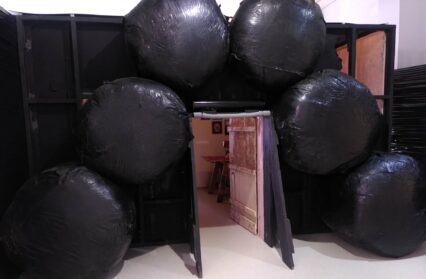Joshua Ludewig reviews Goliath: Playing with Reality, a VR experience showing at WMC’s newly opened immersive space, Bocs. This award-winning project features the voice of Tilda Swinton, exploring mental illness, immersive story-telling and connection found via multiplayer gaming.
Goliath: Playing with Reality, is the latest project attempting to legitimise virtual reality (VR) and immersive film to the same degree that cinema, music, and gaming are accepted by the general public as art forms. The project is a collaborative effort between creative studio ANAGRAM and Floréal Films. However, this isn’t the studio’s first foray into immersive film with its previous projects The Collider and Door into the Dark earning them awards at the Tribeca Film Festival and the Venice International Film Festival. Goliath continues the award-winning trend with a Venice International Film Festival win and a nomination for an Emmy Award. Accolades aside, Goliath, is, at its core, an animated VR experience that explores the limits of reality in this true story of ‘schizophrenia’ and the power of gaming communities as a tool for connection and therapy.
I’d be amiss to not first mention Wales Millennium Centre’s latest venue, Bocs, a dedicated space specially designed for immersive experiences. For the Goliath experience, Bocs is adorned with technical patterns in vibrant colours which set the tone for what lies ahead. The interior is low-lit and void of any outside noise, limiting potential distractions and creating an environment where immersion can flourish. With staff on hand to help with VR headsets and controllers, the experience is made welcoming even to a first-time VR user.
The experience begins with a monologue from Tilda Swinton (voicing Echo) who, with her soothing yet ominous tone, expertly guides you through the controls, acclimating you to this new VR world. Echo proposes questions: Is reality defined by what we can see, hear, and feel? These VR experiences engage the senses, but are they truly “true” when the organic is replaced by the virtual sensations received via a headset? It certainly provokes some inner philosophising, and is likely to send you helter-skelter down the main theme of the experience: what makes up your reality real?
Now, while this may sound like the ravings of someone who’s watched The Matrix too many times (and this reviewer certainly has), Goliath really succeeds in immersing you into this ‘new’ world. At one point, Echo instructs you to look down at your hands (and yes, you can ‘see’ them), where you’ll notice a caterpillar. The visual sensation is obvious, but the clever part is how the controller imitates the movement of the caterpillar, with the subtle and reactive vibration fooling me into believing there was a bug on my hand – this is just one of the many tricks used to enhance the immersion. Still, whether this constitutes a new reality or just a cheap illusion… I’m not sure.
Even so, on the whole technical tricks are peripheral to what makes the entire thing so engaging. Instead, it’s the story that Goliath has to tell that allows you to become fully engrossed in this experience. The story of his life and experiences as a schizophrenic are delivered in a conversational yet highly personal manner, allowing for a deeply human connection – one that is strengthened with the interactivity that VR allows for, compared to a more ‘passive’ experience found in traditional mediums.
For me, this was most apparent when Goliath recalls his childhood through to his teenage years. The narrative is recounted interactively within the context of an arcade game, where you navigate Goliath through multiple levels themed around childhood abuse, adolescence in a rough town, and drug use within the club scene. Whilst I definitely didn’t experience these situations first-hand, the VR allowed me to feel the same anxieties and fear that Goliath did as I navigated his avatar away from abusers, yobs and towards drugs – for a brief moment I was Goliath.
There are still plenty of instances where the storytelling is allowed to breathe in a more traditional way, accompanied by mind-bending visuals and creative use of scale. A calmer, passive experience is present when Goliath describes the positive impact online gaming and streaming had on his mental health, transporting us to a re-creation of his living room, where you are free to look around, an act that felt oddly invasive but deeply moving due to the significance this place held for Goliath. And my experience of living life as Goliath didn’t stop there, during a sequence where a plethora of pills fly at you – which can be swatted away – Goliath lists the drug type and effect to an overwhelming degree which is matched with the intensity of pills flying at you. I even physically dodged as a pill flew at my face (at the amusement of the WMC staff, I’m sure).
Goliath signifies intelligent storytelling and a creative utilisation of VR as, although my reactions seemed normal to me considering what I was perceiving, they might have seemed bizarre to anyone who didn’t share my new reality, paralleling the experiences of those who suffer from schizophrenia and how their reactions might be found strange and incomprehensible by outsiders. I feel this parallel was poignant in helping me understand what life is like for a schizophrenic person, while hopefully also serving to de-stigmatise the condition, by allowing more people to feel the same stigma (to a limited degree).
Creative studio ANAGRAM is determined to continue to bring legitimacy to the immersive film genre by placing another rung on the ladder with Goliath. Where others may have fallen into the trap of relying on the gimmicky side of VR to sell tickets, Goliath successfully navigates this balance delivering a compelling and thought-provoking experience.
Goliath: Playing with Reality will be showing at Wales Millennium Centre’s Bocs until 22nd October.












